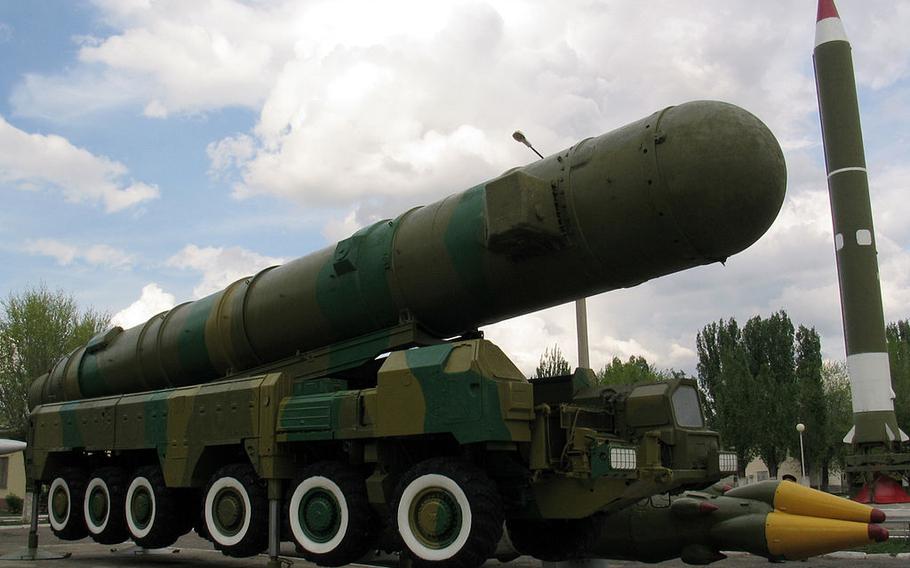Europe
ANALYSISGlobal nuclear arsenal expected to grow for first time since Cold War
The Washington Post June 14, 2022

A medium-range ballistic missile with a nuclear warhead RSD-10 “Pioneer” is shown in an undated photo. The decline in nuclear weapon stockpiles seen since the Cold War is most likely coming to an end, an international arms research group said in a new report that noted the war in Ukraine as a factor. ()
The decline in nuclear weapon stockpiles seen since the Cold War is most likely coming to an end, an international arms research group said in a new report that noted the war in Ukraine as a factor.
Released Monday, the annual report from the Stockholm International Peace Research Institute said that although there had been "several landmarks" in nuclear diplomacy over the past year, the number of nuclear weapons is expected to grow in the next 10 years.
Stockholm International Peace Research Institute Director Dan Smith said in a statement that despite diplomatic achievements, "the risk of nuclear weapons being used seems higher now than at any time since the height of the Cold War."
Conflict in Ukraine has played a role in the heightened risk, the report said. Most nuclear-armed countries have sharpened their rhetoric, and Russia "has even made open threats about possible nuclear weapon use in the context of the war in Ukraine." Stability talks between Russia and the United States, which together possess more than 90% of all nuclear weapons, have stalled since Russia invaded Ukraine. None of the other nuclear-armed countries are pursuing arms control negotiations, the report said.
"This is a very worrying trend," Wilfred Wan, director of the organization's Weapons of Mass Destruction Program, said in a statement.
In January, the five nuclear-armed permanent members of the U.N. Security Council — China, France, Russia, the United Kingdom and the United States — issued a joint statement committing to disarmament and affirming that nuclear war "must never be fought." Yet all five "continue to expand or modernize their nuclear arsenals and appear to be increasing the salience of nuclear weapons in their military strategies," the report said.
The number of nuclear warheads dropped slightly, from 13,080 in 2021 to 12,705 in 2022. Russian and American stockpiles declined, but this was due to dismantling of warheads retired from military service several years ago. The countries' inventories of usable stockpiles stayed relatively stable.
Russia has an estimated 5,977 nuclear warheads, roughly 550 more than the United States, according to the Federation of American Scientists.
Philipp Bleek, an associate professor of nonproliferation and terrorism studies at the Middlebury Institute of International Studies, told The Washington Post that the global nuclear arsenal trend — with major players Russian and the United States stabilizing the size of their arsenals, and some other nations increasing theirs — is concerning.
But what is also concerning, he said, is the "growing salience of nuclear weapons, fronted especially by Russia's invasion of Ukraine . . . and the way Russia has brandished nuclear weapons in that conflict."
Following his announcement of an invasion of Ukraine, Russian President Vladimir Putin ordered nuclear forces on alert — the first time such an order was made since the Russian Federation was established in 1991.
Other countries are watching Russia's actions and listening to their escalating rhetoric, Bleek said, and they may respond by enlarging existing inventories or pursuing new nuclear arsenals.
"When we look back historically — I hope it's not — but this might end up being an inflection point," he said. "One where we can point to a shift that's happening now around the Ukraine conflict that led to more nuclear weapons and a bigger role for the weapons in international conflict."
The role of nuclear weapons, including in light of Russia's invasion of its neighbor, was raised at the recent Shangri-La Dialogue defense summit in Singapore.
"Amid the crisis in Ukraine, the use of nuclear weapons by Russia is being discussed as a real possibility. We must not repeat the scourge of nuclear weapons," Japanese Prime Minister Fumio Kishida said at the summit Friday. "The threat of nuclear weapons, let alone the use of them, should never be tolerated. As the prime minister of the only country that has suffered the devastation of atomic bombings, I strongly appeal for this."
At the summit, Chinese Defense Minister Wei Fenghe said China had made "impressive progress" in developing new nuclear weapons — but added that they would only be used for self-defense.